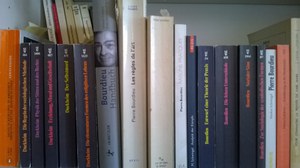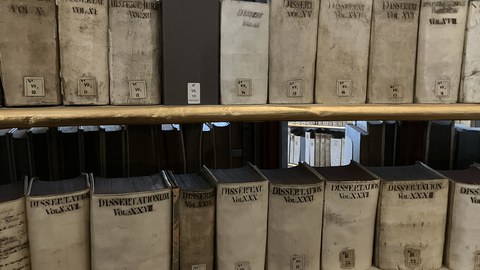Research Focuses
Research is carried out both by the individuals working at the professorship and in connection with research projects and other forms of collaboration. It is characteristic that the people working here share fundamental perspectives, that they work on in distinct subject areas, and that they also set different accents in the theoretical orientations, which, however, complement each other.
One of the most important similarities is the interest in cultural phenomena that are related to the economic and technological structures of modern society; this also implies the inclusion of problems and objects from political economy, economic sociology and the sociology of the mass media. In terms of their specific problem reference, our work research its attention on the role of material culture (of goods and merchandise, technical artefacts, structural orders, etc.), communicative infrastructures (discourse, knowledge, episteme) and media technologies (print, radio, TV, internet) as well as various other media sociation ("Medien der Vergesellschaftung"). A common interest lies in the connections between historical transformations in the societal subfields addressed (and thus the economic, technological, social, scientific and cultural history), major transformations of the social structure, modes of production, consumption relationships and knowledge systems as well as everyday practices and subject formation.
 © Dominik Schrage
© Dominik Schrage
Research contexts
The Chair's research colloquium takes place during the lecture period on Thursdays from 6:30 to 8 p.m. in room FAL 232 (fortnightly for Master's theses) and as a block event during the lecture-free period (for doctoral students), here you can find the current program.
The subproject I of the Collaborative Research Center 1285 of the DFG "Invectivity. Constellations and Dynamics of Disparagement" had the topic "The Philistine Verdict. Forms, Functions and Dynamics of Invective against Social Middle Classes in the Modern Age". It ran from July 2017 to June 2022, with Sonja Engel working on the project and Dominik Schrage leading the sub-project.
The Chair was involved in the research network funded by the Federal Ministry of Education and Research entitled "Things and Sexuality. Production and Consumption in the 20th and 21st Centuries" in the funding line "The Language of Objects - Material Culture in the Context of Social Developments". This network was supported by the Deutsches Hygienemuseum Dresden, the Hannover Medical School and TU Dresden; it ran from November 2018 to November 2021. The Chair participated with the sub-project "Consumer objects: The Significance of Things for Access to Epistemic and Situational Sexuality Knowledge", which was led by Dominik Schrage, project collaborator was Dr. Tino Heim.
The research project "Time has come today. Die Eigenzeiten popmusikalischer Chronotope und ihr Beitrag zur temporalen Differenzierung von Lebenswelten seit den 1960er Jahren" was part of the DFG priority program "Ästhetische Eigenzeiten. Time and Representation in Polychronic Modernity" (Link:http://www.aesthetische-eigenzeiten.de/). It began its work in April 2014 at the University of Lüneburg and was continued from June 2015 to December 2017 at TU Dresden (project leader Dominik Schrage). Dr. Holger Schwetter worked on this project as a postdoc and Anne-Kathrin Hoklas as a doctoral student.
The "Auditory Sociations" research group was formed at the beginning of 2018 and investigates unformed, formed and composed auditory phenomena in their integration into socialization processes. Following on from earlier research by those involved in the field of auditory culture, it examines the situational, historical and cultural conditions under which they occur and become audible, as well as the subjectivities, social groups, institutions and structures for which they become effective.
An overview of doctoral students and ongoing doctoral projects can be found here.
In the journal "Kultursoziologie" (issue 2/2016), the cultural sociology teaching concepts and core research areas at selected German universities were presented. "Cultural sociological research and teaching at the TUD Dresden University of Technology" is also presented in more detail than is possible or appropriate here in an article by Dominik Schrage, Tino Heim and Ingo Blaich. We would like to thank the journal "Kultursoziologie" for the permission to publish this article here!


